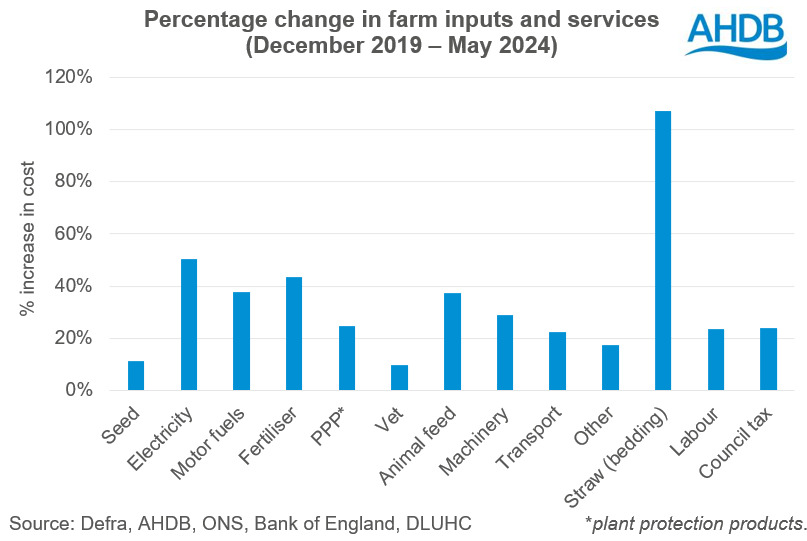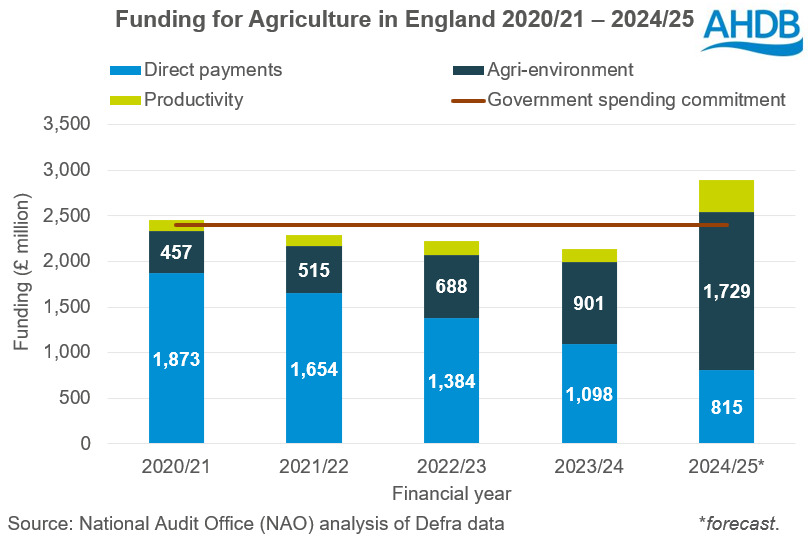Total farm support eroded by underspend and inflation: Grain market daily
Wednesday, 2 October 2024
Market commentary
- UK feed wheat futures (Nov-24) closed yesterday at £186.50/t, up £3.90/t on Monday’s close. The May-25 contract closed at £201.05/t, up £4.05/t over the same period
- The domestic market gained with global wheat prices. Concern over dryness in Australia and Argentina, in combination with weather risk in the northern hemisphere for the winter sowing campaign added support. Ukrainian grain exports were reported to have fallen 16% in September from August due to lower prices disincentivising farmer selling (Ukrainian Agrarian Council)
- Paris rapeseed futures (Nov-24) closed at €477.75/t yesterday, up €7.75/t on Monday’s close. The May-25 contract closed at €487.75/t, up €5.75/t over the same session
- European rapeseed markets gained yesterday as oil markets rose following escalating tension in the Middle East. Also, the European Commission reported that EU rapeseed imports since July had reached 1.19 Mt by 29 Sept, 13% greater than this time last year of 1.05 Mt
- Both sterling and euro weakened slightly yesterday against the US dollar, which further supported London feed wheat and Paris milling wheat and rapeseed futures
Total farm support eroded by underspend and inflation
The funding pot for agriculture in the UK has remained constant at £2.4 billion since the 2019-24 parliament. As we approach the first budget of the newly elected government, we examine how farming costs have changed in line with inflation and what this means for the agricultural budget in real terms going forward.
Farm input costs have increased
For cereals and mixed farms, with fertiliser and machinery related costs the main drivers, input prices increased by 43% from December 2019 to May 2024. This compares with pig farms at 54%, dairy farms at 44%, and beef and sheep farms at 39%.
Consumer price inflation is calculated based on a ‘basket of goods’ representing goods and services consumed by a ‘typical’ household. In this analysis, our ‘basket of goods’ is based on typical costs incurred by farms and the percentage change for those costs from December 2019 to May 2024.

The agricultural budget has remained constant
During the 2019 to 2024 parliament, the impact of £2.4 billion funding pot has been limited by two factors – underspend and inflation. Over the past three financial years (2021/22 to 2023/24), data shows an underspend by the government. However, the latest NAO report on the Farming and Countryside Programme states that Defra expects to spend £2.9 million in 2024/25.

Bigger pot of funding needed to account for inflation
While farm input costs increased by more than 40%, the total funding pot for agriculture has remained constant at £2.4 billion since 2019, thus eroding its value in ‘real’ terms (i.e. taking inflation into account).
To account for the effect of inflation, the farming budget would need to increase by 44% to £3.4 billion. This is without considering any other spending required to support the farming sector.


Sign up to receive the latest information from AHDB.
While AHDB seeks to ensure that the information contained on this webpage is accurate at the time of publication, no warranty is given in respect of the information and data provided. You are responsible for how you use the information. To the maximum extent permitted by law, AHDB accepts no liability for loss, damage or injury howsoever caused or suffered (including that caused by negligence) directly or indirectly in relation to the information or data provided in this publication.
All intellectual property rights in the information and data on this webpage belong to or are licensed by AHDB. You are authorised to use such information for your internal business purposes only and you must not provide this information to any other third parties, including further publication of the information, or for commercial gain in any way whatsoever without the prior written permission of AHDB for each third party disclosure, publication or commercial arrangement. For more information, please see our Terms of Use and Privacy Notice or contact the Director of Corporate Affairs at info@ahdb.org.uk © Agriculture and Horticulture Development Board. All rights reserved.


